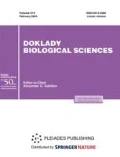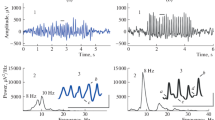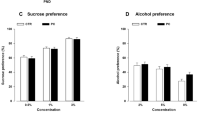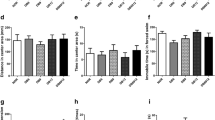Abstract
The aim of this study is to find out whether maternal methyl-enriched diet affects the content of monoamines and their metabolites in brain structures of adult WAG/Rij offspring. It has been shown for the first time that maternal methyl-enriched diet (choline, betaine, folic acid, vitamin B12, L-methionine, zink) during the perinatal period increases dopaminergic tone of the mesolimbic brain system in adult offspring of WAG/Rij rats, which is accompanied by the suppression of the symptoms of genetic absence epilepsy and comorbid depression. Results suggest that maternal methyl-enriched diet during the perinatal period may be served as a new therapeutic strategy to prevent the development of a hypofunction of the mesolimbic dopaminergic brain system and associated genetic absence epilepsy and comorbid depression in offspring.


Similar content being viewed by others
REFERENCES
Sarkisova, K. and van Luijtelaar, G., Prog. Neuro-Psychopharm. Biol. Psychiatry, 2011, vol. 35, pp. 854–876.
Blumenfeld, H., Prog. Brain Res., 2005, vol. 150, pp. 271–286.
Sarkisova, K.Yu., Kulikov, M.A., Kudrin, V.S., et al., Zh. Vyssh. Nervn. Deyat. im. I. P. Pavlova, 2014, vol. 63, no. 3, pp. 303–315.
Sarkisova, K.Yu., Kulikov, M.A., Midzyanovskaya, I.S., et al., Neurosci. Behav. Physiol., 2008, vol. 38, no. 2, pp. 119–128.
Cavarec, F., Krauss, P., Witkowski, T., et al., Epilepsia, 2019, vol. 60, pp. 2128–2140.
Sarkisova, K.Y. and Gabova, A.V., Genes Brain Behav., 2018, vol. 17, no. 7, art. ID e12477.
Sarkisova, K.Yu., Gabova, A.V., Fedosova, E.A., et al., Dokl. Akad. Nauk, 2020, vol. 494, pp. 508–512.
Mischoulon, D. andFava, M., Am. J. Clin. Nutr., 2002, vol. 76, pp. 1158S–1161S.
Sarkisova, K., Fedosova, E., Shatskova, A., et al., Epilepsia, 2021, vol. 62, no. S3, pp. 135–136.
Poletaeva, I.I., Surina, N.M., Ashapkin, V.V., et al., Pharmacol. Biochem. Behav., 2014, vol. 127, pp. 21–26.
Cooney, C.A., Dave, A.A., Wolff, G.L., J. Nutr., 2002, vol. 132, no. 8, pp. 2393S– 2400S.
Nestler, E.J. and Carlezon, W.A., Jr., Biol. Psychiatry, 2006, vol. 59, pp. 1151–1159.
Shirayama, Y. and Chaki, S., Curr. Neuropharmacol., 2006, vol. 4, pp. 277–291.
Kitamura, Y., Yagi, T., Kitagawa, K., et al., Naunyn-Schmiedebergs Arch. Pharmacol., 2010, vol. 382, pp. 151–158.
Hajnal, A. and Norgren, R., Brain Res., 2001, vol. 904, pp. 76–84.
Deransart, C., Riban, V., Marescaux, C., et al., Neuroscience, 2000, vol. 100, pp. 335–344.
Cavalheiro, E.A., Fernandes, M.J., Turski, L., et al., Epilepsia, 1994, vol. 35, pp. 1–11.
Floresco, S.B., Todd, C.L., Grace, A.A., J. Neurosci., 2001, vol. 21, pp. 4915–4922.
Dhediya, R.M., Joshi, S.S., Gajbhiye, S.V., et al., Epilepsy Behav., 2016, vol. 61, pp. 153–157.
Luo, X., Fang, T.-Y., Zhang, Y., et al., Neuropsychiatry (London), 2018, vol. 8, pp. 495–504.
Funding
The reported study was funded by RFBR, project no. 20-015-00327а.
Author information
Authors and Affiliations
Corresponding author
Ethics declarations
Conflict of interests. The authors declare that they have no conflict of interest.
Statement on the welfare of animals. Experiments were performed in accordance with the European Union Directive 210/63/EU on the protection of animals used for scientific purposes and the principles formulated in the regulations adopted at IHNA and NPh RAS.
Rights and permissions
About this article
Cite this article
Sarkisova, K.Y., Fedosova, E.A., Shatskova, A.B. et al. Maternal Methyl-Enriched Diet Increases Dopaminergic Tone of the Mesolimbic Brain System in Adult Offspring of WAG/Rij Rats. Dokl Biol Sci 506, 145–149 (2022). https://doi.org/10.1134/S001249662205012X
Received:
Revised:
Accepted:
Published:
Issue Date:
DOI: https://doi.org/10.1134/S001249662205012X




